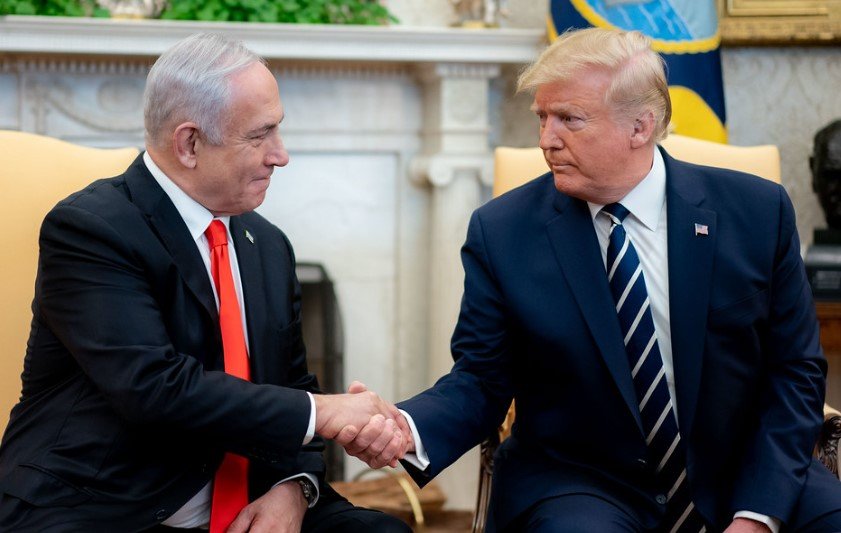As the US prepares for direct negotiations with Tehran, President Trump signals both opportunity—and serious consequences.
Amid rising tensions in the Middle East, President Donald Trump confirmed that the United States will begin direct nuclear talks with Iran this coming Saturday. The announcement came with a sharp warning: if Iran doesn’t come to the table seriously, it could face what Trump called a “very bad day.”
The talks, Trump said, will happen “at almost the highest level,” but he kept tight-lipped on where exactly they’ll take place. The message was clear, though. Tehran is on notice.
A Familiar Setting, A Familiar Ally
The backdrop for Monday’s announcement wasn’t random.
Trump made the remarks after sitting down with Israeli Prime Minister Benjamin Netanyahu at the White House. The two men have often appeared in sync on Iran’s nuclear ambitions, both viewing the prospect of a nuclear-armed Iran as a non-starter.
Only a few minutes into the press briefing, Trump pivoted straight into the topic: “Tehran can’t get nuclear weapons,” he said flatly. No fluff. No hedging.
The conversation was brief but pointed. And the subtext? U.S. patience is running low.

Saturday’s Talks: Uncertainty Lingers Over Venue and Format
The one thing we don’t know is where the talks will happen.
Despite mentioning that the negotiations would be at “almost the highest level,” Trump didn’t provide details about the location or who exactly would be sitting across from whom.
And that lack of clarity has already raised eyebrows.
For context:
-
Direct talks between the U.S. and Iran have been rare since the Trump administration pulled out of the 2015 nuclear deal.
-
The last time anything close to this happened, it was through backchannels or with mediators in the room.
Now? Trump says it’s just the two of them. Straight up.
What Trump Actually Said—and Didn’t Say
Let’s break down the words, because in Trump’s world, what’s said—and what’s left unsaid—both matter.
“We’re dealing with them directly and maybe a deal is going to be made,” Trump offered, almost casually. Then came the pivot: “Doing a deal would be preferable to doing the obvious.”
That phrase—doing the obvious—hung in the air like a thick fog.
It’s classic Trump: hint at military action without ever confirming it. But when pressed directly on whether that meant force, he didn’t backpedal. Instead, he dropped the line that’s now grabbing headlines:
“Iran is going to be in great danger, and I hate to say it.”
The Bigger Picture: Why It’s Happening Now
There’s a bigger play here, and timing matters.
The Middle East has been volatile in recent months. Iran has been making moves—military drills, rhetoric, uranium enrichment reports—that have set off alarm bells from Washington to Tel Aviv.
Meanwhile, the U.S. is juggling:
-
Ongoing support for Israel’s security.
-
Regional diplomacy with Saudi Arabia and the UAE.
-
Domestic pressure heading into election season.
This isn’t just about Iran.
It’s about optics. It’s about control. And let’s be real—it’s also about November.
What We Know About Iran’s Response So Far
Iran hasn’t officially responded to Trump’s statements yet. No press conference, no dramatic counter-threat.
But Iranian state-affiliated media did run a segment Monday night highlighting “hostile rhetoric” from the U.S. president. One analyst called Trump’s remarks “provocative, arrogant, and destabilizing.”
Historically, Tehran doesn’t show its cards early. Expect a delayed but sharp-toned reaction—especially if the talks don’t pan out.
A Deal or a Blow-Up? Experts Are Split
Foreign policy experts are already chiming in, and yeah, opinions are all over the place.
Some think this could actually work. Others believe it’s doomed before it begins. And a few are just worried it’s all smoke and mirrors before a bigger confrontation.
Here’s a quick look at what analysts are predicting:
| Expert | Affiliation | Take on Trump-Iran Talks |
|---|---|---|
| Michael Singh | Washington Institute | “If both sides are serious, there’s a path. But Trump’s tone won’t help.” |
| Trita Parsi | Quincy Institute | “This isn’t diplomacy, it’s coercion. Iran won’t bow to threats.” |
| Kori Schake | AEI | “Trump is setting up a binary: talk or get bombed. That rarely ends well.” |
Basically, the jury’s out.
Why This Matters Beyond Just Nukes
It’s tempting to view this as just another headline. But there’s more at stake here than centrifuges and uranium stockpiles.
A misstep—or misquote—could light a match in a region that’s already on edge.
And there’s a human side to all this, too. The people of Iran, already under immense economic pressure from sanctions, could be the ones who suffer most if diplomacy breaks down.
